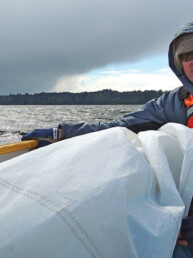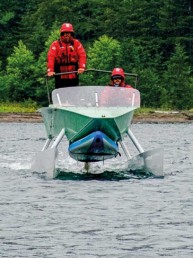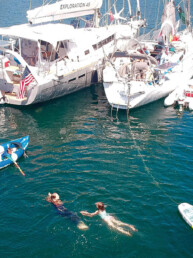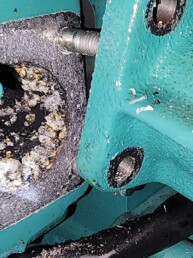An Interesting and Informative Electrical Seminar Sparks a Bevy of Boaty Questions
 The following are excerpts from a recorded conversation between me and my good friend, Garry Hoffman, at the bar, Anchor, in Port Townsend following Nigel Calder’s daylong seminar on boat electrical systems during the 2023 Wooden Boat Festival.
The following are excerpts from a recorded conversation between me and my good friend, Garry Hoffman, at the bar, Anchor, in Port Townsend following Nigel Calder’s daylong seminar on boat electrical systems during the 2023 Wooden Boat Festival.
Garry owns a 1980 Baba 35, which he recently repowered with an electric motor. And I own a 1984 Passport 40 that I have fully rewired. In doing so, both of us have spent far too much time in parts of our boats not intended for human habitation.
The following conversation has been edited to omit some casual profanity, but otherwise, its two excited sailors — and boat owners — shooting the breeze about boat ownership, life afloat, electrical systems, and why we all should be worried about heading into the sweet hereafter, Viking-style, in a burning boat.
Marty: Wow, that was a long day. So what do you think was like the big takeaway for you, Garry?
Garry: The first 80 percent of it, I was worried that my boat is going to burn down from the many ways that it can burn down.
M: I now know when I wake up at 4:00 in the morning, if I need something to worry about, I can just go through the 30 things I just learned I should be stressed about.
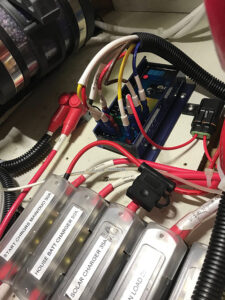 G: It’s terribly complicated. I need to think of my electrical system just like every other system. When was the last time I opened the electrical panel and just checked connectors? It’s like you put a new circuit in and then you just forget about it. But what happens to it over time?
G: It’s terribly complicated. I need to think of my electrical system just like every other system. When was the last time I opened the electrical panel and just checked connectors? It’s like you put a new circuit in and then you just forget about it. But what happens to it over time?
M: I always think I’ll never forget what I’m doing when I’m installing or fixing something on the boat. I mean, I just spent several weeks working intensely on this electrical project. And then a year later, I look at it and it’s like, ‘what did I do?’
G: The other thing I took away from Nigel’s seminar is it’s scary how a small mistake can cost you, right? Like accidentally putting a stainless steel washer between the fuse and wire (in an ANL-style fuse holder) causing resistance that then melts it. Or how a loose nut or a bad connection can lead to disaster.
M: One thing the seminar validated was some of the early choices I made during the 10 years of refitting projects. In terms of the boat’s electrical system, the first thing I thought was, “How do I reduce my demand as a starting point?” And then size the rest accordingly. It was nice to hear that’s a smart thing to do.
G: I liked that he made me comfortable by admitting he has messed up many times, just like I have. You know it didn’t make him stop, right? I mean, you just use that as a learning opportunity. And I think that’s a big differentiator when people get into boating — if you take it seriously, you have to enjoy solving problems and know that you’re going to have problems.
When I was installing my electric motor, I crimped a ring terminal too tight. Over the last four or five months, I’ve been sailing pretty hard. That terminal literally just worked loose to where it cracked completely and opened the circuit which stopped the cooling system. The solution was easy: I just had to cut it off, put a new terminal on, and I was back in business. But that was the thing. I was like, ‘How many ring terminals did I crimp on that motor project? Hundreds.’ But that one made that circuit fail.
M: No matter how methodical you are, there’s going to be something you overlook and mess up, right? But one of the takeaways from today is that you can develop the knowledge to figure out what went wrong and then fix it. And that you need to have the fail-safes in place so when you actually mess up, you’re not going to, you know… die.
G: Thermal runaway!
M: That is going to be the name of your next boat.
G: Yes! Thermal runaway. All I can think about is my motor battery bank just melting down through the keel.
(Note: Calder discussed the dangers of a damaged battery entering a state of “thermal runaway,” in which increased temperature releases stored energy in the battery that increases temperature even more. In other words, when your boat battery goes supernova.)
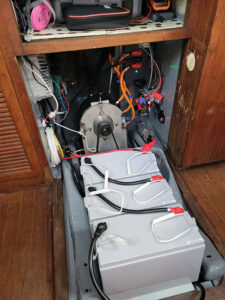 M: Hahaha. Seriously, it’s one thing for you and I who have old boats to care about this stuff because we know that our boats were built in a different era. They had systems that aren’t up to snuff by today’s standards. But (Calder) was completely unsparing in showing how even some new boats right out of the factory were just horrendously wrong.
M: Hahaha. Seriously, it’s one thing for you and I who have old boats to care about this stuff because we know that our boats were built in a different era. They had systems that aren’t up to snuff by today’s standards. But (Calder) was completely unsparing in showing how even some new boats right out of the factory were just horrendously wrong.
G: Yeah, in a way, I actually feel a lot better about my skill set now! It is kind of a weird gray area where you think about all the boats in a marina and how probably many of those electrical systems only get checked when someone’s trying to sell the boat and it goes through a survey.
M: It fully underscored that to me there are people who just love to go out and use their boats and that’s great, that’s wonderful. But if you’re going to own a boat — and be serious about it — you’ve got to love the other part of that, which is understanding the systems and then being willing to fix, troubleshoot, and repair them. Because if you aren’t that way, it is actually it does freak you out a little bit how many things could go wrong.
G: It would be interesting to take a poll of a large group of boaters to see where they fall. The long-range, offshore cruising types have a natural bent toward “you better know how to fix it because you’re on your own.” But admittedly, that’s probably a very small fraction of the people who are boating, right?
Take our friends (name withheld to protect the guilty). They bought a boat. They don’t know anything about boats. They are not handy. And I explained as they were starting out that they are either going to write a lot of checks (to repair things) or they are going to have problems that don’t get fixed. And they didn’t want to write checks. So they’ve owned the boat for like six years, and nothing has been done to it. It’s still sitting at the dock.
M: You’re right. We’re skewed in that we’re pretty committed to this as a very full-time kind of hobby.
G: I tell people all the time, I enjoyed putting the electric motor in. That was like a 6-month project over the winter. I enjoyed that as much as I now enjoy using the boat. You know what I mean?
M: Absolutely I do. I don’t want to exclusively work on my boat. But I love to focus on an interesting project because it’s a set of challenges that you have to figure out, understand, and solve. It’s like an adult puzzle, basically.
G: Yeah… I’m literally going to go over every wire in my boat now and look for loose nuts and broken stuff. But that’s cool. That’s going to be fun.
M: Let’s get another beer first. Any final thoughts?
G: Try to make sure your boat doesn’t freaking burn down. Because apparently there’s only 5,000 ways it could happen!
M: And if it does, it’s because you didn’t know something.
Marty McOmber is a Pacific Northwest sailor, writer, and strategic communications professional. He is currently working on refitting and improving his 1984 Passport 40, Rounder, for continued cruising adventures near and far.

